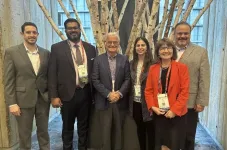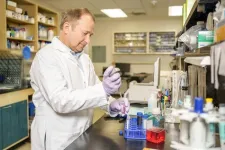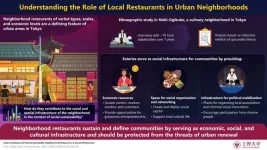(Press-News.org) San Francisco and New York — Dec. 13, 2023 — The Parker Institute for Cancer Immunotherapy (PICI), the largest concentration of immuno-oncology (IO) expertise in the world, announced it has added Weill Cornell Medicine to its network of preeminent academic and medical research institutions at the forefront of the fight against cancer. Under the agreement, Weill Cornell Medicine, with new PICI Network researchers, will establish a PICI immuno-oncology research center in New York City.
Since its inception, PICI has distributed $260 million to member researchers to support scientific research at its member research institutions, with Weill Cornell Medicine as the latest addition to its PICI Network. Dr. Jedd Wolchok, the Meyer Director of the Sandra and Edward Meyer Cancer Center at Weill Cornell Medicine, and Dr. Taha Merghoub, Meyer Cancer Center deputy director, will co-direct the new PICI immuno-oncology research center.
Funding for PICI’s centers supports bold, scientific research while bridging academia and biotech. PICI funds groundbreaking research and incubates, launches, and invests in new biotech companies. Its key focus is developing breakthroughs and technologies that can be translated quickly into curative treatments for patients. The expansion of PICI on the East Coast represents a new phase for the institute, enabling the development of more therapeutic approaches and technologies for cancer patients.
“We are proud to welcome Weill Cornell Medicine to the PICI Network under the leadership of Drs. Wolchok and Merghoub, who serve as center director and co-director,” said Sean Parker, PICI founder and chairman, whose previous philanthropy includes a 2013 gift that established the Sean Parker Institute for the Voice at Weill Cornell Medicine. “Dr. Wolchok is one of the most distinguished researchers in the world, and his impact on the field of immunology has been immeasurable. His deep understanding of PICI’s uniquely ambitious and collaborative approach and true passion for innovative scientific research form an incredible foundation upon which to build transformative patient impact at Weill Cornell Medicine.”
Collaboration with Weill Cornell Medicine
Weill Cornell Medicine scientists target some of the most formidable health challenges of the 21st century, including cancer. PICI funding at Weill Cornell Medicine will facilitate the recruitment of world-class cancer immunology researchers; enable high-risk, high-reward cancer research studies to be conducted; support the training and development of the next generation of elite cancer clinician-researchers; and contribute to health equity and community outreach programs in the New York area.
“The collaborative nature of the PICI Network and flexible nature of funding is critical for rapid progress,“ Dr. Wolchok said. “The PICI collaborative network has in the past decade helped facilitate advances in cancer research that I could not have imagined before. I am excited to continue my collaboration with PICI in my new role at Weill Cornell Medicine.”
Dr. Wolchok has been involved with PICI since its early days, having formerly served as Center Director for the PICI Center at Memorial Sloan Kettering Cancer Center, where he leveraged PICI funding to build out a top immunology research facility, was the primary investigator on PICI’s MAHLER clinical trial, and mentored nine PICI Early Career Researcher Awardees. His leadership philosophy of promoting deep collaboration and driving innovation fully aligns with PICI’s mission and vision.
A geneticist by training with expertise in immuno-oncology, Dr. Merghoub has been a Parker member researcher since its inception. Together, Drs. Wolchok and Merghoub lead a laboratory that is dedicated to improving and developing new approaches to cancer treatment, especially those that target the immune system.
Listen to Dr. Wolchok elaborate on the mission of the newly formed PICI Center at Weill Cornell Medicine, on PICI’s Podcast, “From Bench to Fireside.”
About the Parker Institute for Cancer Immunotherapy
The Parker Institute for Cancer Immunotherapy (PICI) is radically changing how cancer research is done. Founded in 2016 through a $250 million gift from Silicon Valley entrepreneur and philanthropist Sean Parker, the San Francisco-based nonprofit is an unprecedented collaboration between the country’s leading immunotherapy researchers and cancer centers. PICI Network research institutions include Stanford Medicine; the University of California, Los Angeles; the University of California, San Francisco; the University of Pennsylvania; Dana-Farber Cancer Institute; Gladstone Institutes; and Weill Cornell Medicine. PICI also supports top researchers at other institutions, including The University of Texas MD Anderson Cancer Center, Memorial Sloan Kettering Cancer Center, City of Hope, Fred Hutchinson Cancer Research Center, Icahn School of Medicine at Mount Sinai, Institute for Systems Biology and Washington University School of Medicine in St. Louis. By forging alliances with academic, industry and nonprofit partners, PICI makes big bets on bold research to fulfill its mission: to accelerate the development of breakthrough immunotherapies to turn all cancers into curable diseases. Find out more at parkerici.org and follow us on LinkedIn, X (formerly Twitter) @parkerici, and on Spotify.
About Weill Cornell Medicine
Weill Cornell Medicine is committed to excellence in patient care, scientific discovery and the education of future physicians in New York City and around the world. The doctors and scientists of Weill Cornell Medicine—faculty from Weill Cornell Medical College, Weill Cornell Graduate School of Medical Sciences, and Weill Cornell Physician Organization—are engaged in world-class clinical care and cutting-edge research that connect patients to the latest treatment innovations and prevention strategies. Located in the heart of the Upper East Side’s scientific corridor, Weill Cornell Medicine’s powerful network of collaborators extends to its parent university Cornell University; to Qatar, where Weill Cornell Medicine-Qatar offers a Cornell University medical degree; and to programs in Tanzania, Haiti, Brazil, Austria and Turkey. Weill Cornell Medicine faculty provide exemplary patient care at NewYork-Presbyterian/Weill Cornell Medical Center, NewYork-Presbyterian Westchester Behavioral Health Center, NewYork-Presbyterian Lower Manhattan Hospital, NewYork-Presbyterian Queens and NewYork-Presbyterian Brooklyn Methodist Hospital. Weill Cornell Medicine is also affiliated with Houston Methodist. For more information, visit weill.cornell.edu.
Media Contacts:
For the Parker Institute for Cancer Immunotherapy
press@parkerici.org
For WCM
Eliza Powell
Elp4014@med.cornell.edu
(646) 962-9499
END
Parker Institute for Cancer Immunotherapy (PICI) welcomes Weill Cornell Medicine to cancer research consortium
Weill Cornell Medicine to establish cancer immunology research center in New York City with PICI funding. Collaboration expands PICI’s East Coast footprint with top academic and medical research centers
2023-12-13
ELSE PRESS RELEASES FROM THIS DATE:
Saving endangered species: New AI method counts manatee clusters in real time
2023-12-13
Manatees are endangered species volatile to the environment. Because of their voracious appetites, they often spend up to eight hours a day grazing for food within shallow waters, making them vulnerable to environmental changes and other risks.
Accurately counting manatee aggregations within a region is not only biologically meaningful in observing their habit, but also crucial for designing safety rules for boaters and divers as well as scheduling nursing, intervention, and other plans. Nevertheless, counting manatees ...
National cardiogenic shock initiative study results show significant increase in heart attack survival
2023-12-13
DETROIT (December 13, 2023) – Published results of a large, national heart attack study show that patients with a life-threatening complication known as cardiogenic shock survived at a significantly higher rate when treated with a protocol developed by cardiologists at Henry Ford Health, in collaboration with 80 hospitals nationwide.
Cardiogenic shock is a critical condition in which the heart is unable to pump enough blood to sustain the body’s needs, depriving vital organs of blood supply. This can cause those organs to eventually stop functioning. The typical survival rate of this deadly complication during a heart ...
Time to abandon null hypothesis significance testing? Moving beyond the default approach to statistical analysis and reporting
2023-12-13
Researchers from Northwestern University, University of Pennsylvania, and University of Colorado published a new Journal of Marketing study that proposes abandoning null hypothesis significance testing (NHST) as the default approach to statistical analysis and reporting.
The study, forthcoming in the Journal of Marketing, is titled “‘Statistical Significance’ and Statistical Reporting: Moving Beyond Binary” and is authored by Blakeley B. McShane, ...
Extracting uranium from seawater as another source of nuclear fuel
2023-12-13
Oceans cover most of Earth’s surface and support a staggering number of lifeforms, but they’re also home to a dilute population of uranium ions. And — if we can get these particular ions out of the water — they could be a sustainable fuel source to generate nuclear power. Researchers publishing in ACS Central Science have now developed a material to use with electrochemical extraction that attracts hard-to-get uranium ions from seawater more efficiently than existing methods.
Nuclear power reactors release ...
Medicare doesn’t cover obesity drugs, but 76% of older adults think it should
2023-12-13
The vast majority of older adults – 83% -- think health insurers should cover medications that can help people with obesity manage their weight, a new poll of people age 50 to 80 finds.
Nearly as many -- 76% -- believe Medicare should cover these drugs, which it cannot currently do under law, according to the new results from the University of Michigan National Poll on Healthy Aging.
A law passed in 2003 prohibits Medicare from covering weight loss medications, though it can cover drugs to help people with Type 2 diabetes manage their weight. Medicaid covers obesity medications ...
TTUHSC researcher to study new pathway to inhibit protein found in many cancers
2023-12-13
With an estimated 1.9 million new cases and more than 600,000 deaths each year, cancer remains the second most common cause of death in the U.S., trailing only heart disease. And while there are more than 200 types of cancer, the abnormal synthesis of a protein known as STAT3 is unique to the majority of tumors.
STAT3 is known as a transcriptional regulator, which means it regulates the expression of several genes. In fact, STAT3 is associated with approximately 70% of all human tumors and is responsible for uncontrolled cell growth and disease progression.
To investigate new approaches to inhibit STAT3 and develop new cancer treatments, the National Institutes of Health-National ...
The shape of dogs' heads affects their sleep
2023-12-13
Flat-faced dog breeds are popular all over the world. In the USA and in Hungary, the French Bulldog is currently the most common breed. However, their popularity comes at a high cost in terms of health: shortened skulls are associated with deteriorative brain morphology changes, breathing difficulties and sleep problems. According to recent findings by Hungarian researchers, flat-faced dogs sleep more because their breed-specific sleep apnea increases daytime sleepiness, their REM sleep phase is longer than ...
UTSA names Department of Defense leader David Brown as NSCC Executive Director
2023-12-13
The University of Texas at San Antonio today announced the selection of David Brown as the new executive director of its National Security Collaboration Center (NSCC) and professor of practice. Brown will join UTSA with decades of experience leading collaborative research and development ecosystems supporting U.S. national defense strategies.
Brown is a trusted, well-connected leader in civilian and military communities nationwide who has especially strong relationships within U.S. Department of Defense (DoD) organizations, laboratories and commands and has gained national recognition for his transformative leadership in federal research ...
Nourishing communities: neighborhood restaurants as social infrastructure
2023-12-13
Studies on sustainability inevitably touch on food-related topics like food security, culinary heritage, and the sustenance of vulnerable people. Social sustainability is one of the three pillars of sustainability, alongside environmental and economic sustainability, and has become a pivotal topic in various research fields. It includes concerns about social justice, resource distribution and recognition, and political participation of marginalized groups at the local community level.
Very few studies of social sustainability have looked at urban foodways in terms of social and cultural infrastructure. More often than not, scholars in Japan have ...
Resource-efficient and climate-friendly with sodium-ion batteries
2023-12-13
The transition to a society without fossil fuels means that the need for batteries is increasing at a rapid pace. At the same time, the increase will mean a shortage of the metals lithium and cobalt, which are key components in the most common battery types. One option is a sodium-ion battery, where table salt and biomass from the forest industry make up the main raw materials. Now, researchers from Chalmers University of Technology, Sweden, show that these sodium-ion batteries have an equivalent climate impact as their lithium-ion counterparts – without the risk of running out of raw materials.
"The materials ...
LAST 30 PRESS RELEASES:
PhD student maps mysterious upper atmosphere of Uranus for the first time
Idaho National Laboratory to accelerate nuclear energy deployment with NVIDIA AI through the Genesis Mission
Blood test could help guide treatment decisions in germ cell tumors
New ‘scimitar-crested’ Spinosaurus species discovered in the central Sahara
“Cyborg” pancreatic organoids can monitor the maturation of islet cells
Technique to extract concepts from AI models can help steer and monitor model outputs
Study clarifies the cancer genome in domestic cats
Crested Spinosaurus fossil was aquatic, but lived 1,000 kilometers from the Tethys Sea
MULTI-evolve: Rapid evolution of complex multi-mutant proteins
A new method to steer AI output uncovers vulnerabilities and potential improvements
Why some objects in space look like snowmen
Flickering glacial climate may have shaped early human evolution
First AHA/ACC acute pulmonary embolism guideline: prompt diagnosis and treatment are key
Could “cyborg” transplants replace pancreatic tissue damaged by diabetes?
Hearing a molecule’s solo performance
Justice after trauma? Race, red tape keep sexual assault victims from compensation
Columbia researchers awarded ARPA-H funding to speed diagnosis of lymphatic disorders
James R. Downing, MD, to step down as president and CEO of St. Jude Children’s Research Hospital in late 2026
A remote-controlled CAR-T for safer immunotherapy
UT College of Veterinary Medicine dean elected Fellow of the American Academy of Microbiology
AERA selects 34 exemplary scholars as 2026 Fellows
Similar kinases play distinct roles in the brain
New research takes first step toward advance warnings of space weather
Scientists unlock a massive new ‘color palette’ for biomedical research by synthesizing non-natural amino acids
Brain cells drive endurance gains after exercise
Same-day hospital discharge is safe in selected patients after TAVI
Why do people living at high altitudes have better glucose control? The answer was in plain sight
Red blood cells soak up sugar at high altitude, protecting against diabetes
A new electrolyte points to stronger, safer batteries
Environment: Atmospheric pollution directly linked to rocket re-entry
[Press-News.org] Parker Institute for Cancer Immunotherapy (PICI) welcomes Weill Cornell Medicine to cancer research consortiumWeill Cornell Medicine to establish cancer immunology research center in New York City with PICI funding. Collaboration expands PICI’s East Coast footprint with top academic and medical research centers







